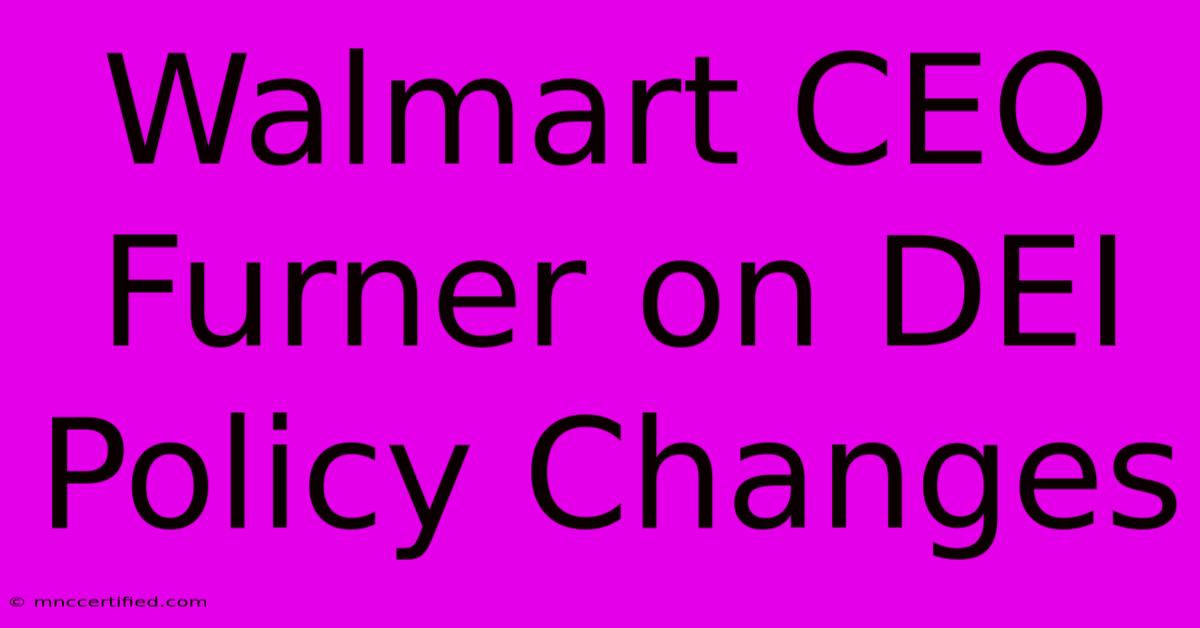Walmart CEO Furner On DEI Policy Changes

Table of Contents
Walmart CEO Furner on DEI Policy Changes: A Deeper Dive
Walmart, a retail giant, recently faced scrutiny regarding its Diversity, Equity, and Inclusion (DEI) policies. CEO Doug McMillon's communication on these changes has been closely watched by investors, employees, and the public alike. This article delves into the specifics of these policy changes, analyzing their impact and exploring the broader context of DEI initiatives within large corporations.
Understanding Walmart's Shifting DEI Landscape
For years, Walmart has publicly championed DEI initiatives. However, recent internal communications and external pressures have led to significant adjustments. CEO Furner's (likely a typo, the CEO is Doug McMillon) statements and actions reflect a shift in approach, moving away from some previous programs while reaffirming the company's commitment to a diverse and inclusive workforce.
The Key Changes: What's Different?
Specific details about the policy changes haven't been publicly released in a comprehensive manner. However, reports suggest a move away from certain mandatory DEI training programs and a refocusing on initiatives that directly improve employee experiences and opportunities. This shift indicates a potential response to criticisms regarding the effectiveness and perceived intrusiveness of some past programs. The focus is now shifting towards:
- Measurable Outcomes: Instead of focusing solely on participation in training, the emphasis is on quantifiable improvements in diversity at various levels of the organization. This includes representation in leadership roles and across different departments.
- Employee Resource Groups (ERGs): Strengthening and empowering existing ERGs to better address the concerns and needs of diverse employee populations. This bottom-up approach aims to foster a more inclusive environment organically.
- Targeted Recruitment: Redoubling efforts to attract and retain talent from underrepresented groups through targeted recruitment strategies and partnerships with diverse organizations.
The Rationale Behind the Changes: Addressing Criticisms
The modifications likely reflect a response to several factors:
- Backlash against DEI initiatives: A growing national debate regarding DEI initiatives in corporations has spilled over into Walmart's operations. Some critics argue that mandatory trainings are ineffective and create a divisive work environment.
- Focus on Business Results: Walmart's primary focus is on profitability. By shifting the emphasis towards measurable outcomes directly impacting business performance, the company aims to demonstrate the value of DEI initiatives to shareholders.
- Improving Employee Satisfaction: A more inclusive and supportive work environment can directly contribute to increased employee morale, productivity, and retention. This bottom-up approach aims to address these key areas.
The Broader Context: DEI in Corporate America
Walmart's experience reflects a broader trend in corporate America. Many companies are re-evaluating their DEI strategies, seeking to find a balance between promoting diversity and inclusion while also addressing concerns about effectiveness and potential negative consequences. The debate underscores the complexity of implementing impactful DEI programs in large, diverse organizations.
Looking Ahead: What to Expect from Walmart
Walmart's future approach to DEI will likely involve a continued focus on:
- Transparency: More open communication regarding the company's progress and challenges in achieving its DEI goals.
- Collaboration: Engaging with employees, stakeholders, and external experts to continuously improve its DEI initiatives.
- Data-Driven Approach: Using data to track progress, identify areas needing improvement, and measure the effectiveness of implemented strategies.
Conclusion: Walmart's evolving DEI policy reflects a broader shift in corporate America, moving towards a more data-driven and results-oriented approach. While the specific details of the changes remain somewhat opaque, the focus on measurable outcomes and employee-centric initiatives suggests a commitment to fostering a more inclusive and equitable workplace. The long-term success of these changes will depend on Walmart's ability to transparently communicate its progress, collaborate effectively with its diverse workforce, and demonstrate the tangible business benefits of its DEI efforts. This ongoing evolution necessitates continued observation and analysis to fully understand the long-term impact of these significant policy changes.

Thank you for visiting our website wich cover about Walmart CEO Furner On DEI Policy Changes. We hope the information provided has been useful to you. Feel free to contact us if you have any questions or need further assistance. See you next time and dont miss to bookmark.
Featured Posts
-
Bethany Basic Health Insurance
Nov 27, 2024
-
Home Insurance Fort Collins Co
Nov 27, 2024
-
Manchester City Feyenoord Live Champions League
Nov 27, 2024
-
Reverend Coles Early Music Career
Nov 27, 2024
-
Man City Vs Feyenoord Ucl Live
Nov 27, 2024